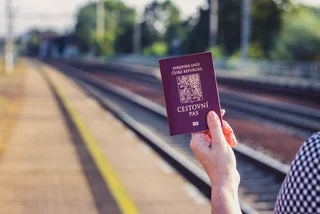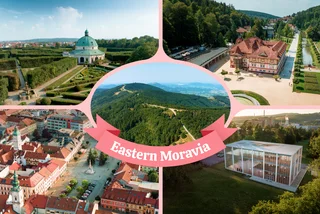It’s been a long time coming. Following the constitutional court’s ruling against an early election last fall, the Czech Republic should have its first elected government since the naming of Fisher’s interim government a year ago, when he took over from Topolánek’s center-right coalition, which was ousted by a vote of no confidence in March 2009. Exciting year, eh?
Given the Czech proportional electoral system, it is unlikely any party will secure the absolute majority of 101 seats in the lower house to govern outright. A coalition of three or more of the parties listed below is most likely. The parties are listed in order, depending on how many seats they are expected to win in the lower house, the Chamber of Deputies, from most seats to fewest.
The Social Democratic Party (ČSSD)
The leader of the party, Jiří Paroubek, has courted controversy during this current campaign. Despite the perception of strong public opposition to him, the party has been leading the opinion polls of the last month.
ČSSD is running under the slogan Change and Hope (Změna a Naděje). The changes the party intends for the country include the cancellation of the current flat tax system and a return to a progressive tax system. The rate they consider ‘acceptable’ would be the one from 2005 – 2007.
Another clear part of their policy is that they would seek to adopt the Euro by 2015-2016. Of the major parties, they are the only one to give a definite date on monetary convergence. Their position is interesting given that according to one poll, ČSSD supporters were among those who opposed the currency’s adoption. ČSSD are strongly in favor of EU integration and support “the fastest introduction of the Lisbon Treaty into practice.”
The party also clearly favors redistributive policies in the area of health and welfare. They have promised to remove the medical regulation fee and pay a one-off extra thirteenth pension payment to pensioners from the profits of ČEZ, the country´s main producer of electricity. The company is mostly in state hands.
The Civil Democratic Party (ODS)
Petr Nečas has come to the helm of the Czech Republic’s largest center right party, following the recent resignation of Mirek Topolánek. The party’s program this year is called Vision 2020.
Fiscal restraint and reducing public debt is the centerpiece of the party’s policy. To achieve this they propose, if necessary, adopting a constitutional law to ensure budgetary responsibility. Less dramatically, they have also suggested reductions to ministerial spending and pension reform, which would include voluntary contributions.
Regarding health regulation fees, the party aims to maintain them, as well as to introduce measures for private contributions for ‘above standard’ care. However, it does not support a complete user-pay health system for all people. They continue to support a flat-tax with further simplification of the payment process.
The Communist Party (KSČM)
It might seem tactless to include the Communist party in these democratic times, but you must remember that in a number of polls during the campaign, the party comes in third; though support according to the same source appears to have waned.
So what are the Communists campaigning for in this post-communist era? In a word, security; though in a social rather than military sense. The party proposes regulating the price of energy and water, introducing non-interest loans for housing for newlyweds, a minimum monthly wage of 14,000 CZK and gradually increasing the minimum pension to 10,000 CZK per month. They support the reduction of VAT to 5% on basic goods and no VAT on food and medicine. On the flip side, they support a tax increase on legal entities and dividends.
TOP 09
Karel Schwarzenberg’s unlikely celebrity status doesn’t appear to reflect the overall popularity of the party, who are in fourth place since entering the political scene last year. TOP 09 stands for Tradice (Tradition) Odpovědnost (Responsibility) Prosperita (Prosperity) and 09 is for 2009, the year it was established.
TOP 09 presents itself as the other center-right party, though their policies pursue even stricter austerity measures than ODS. These measures include reductions to wages paid from the state budget; reducing by 50% state contributions to political parties; reducing all state benefits by 10% and not providing pensioners with a cost of living increase in 2011. Along with this ‘belt-tightening’ the party supports contributions to health services and pension funds.
The party officially supports the EU and is in favor of EU expansion into the Balkan states. However, it does not support setting a fixed date for EU adoption.
Public Affairs (VV)
This party has been around for a few years; however, this campaign has seen them enjoy quite substantial support in the polls. Screenwriter and novelist, Radek John became the party leader in June 2009. Two months earlier it was reported he had made a donation to the party.
The party´s election program has been released as a ten-point plan (Desatero Věci veřejných). This program includes competition for above standard health care; 20% reduction in public tenders; 10% reduction in the number of civil servants; pension reform and stricter conditions for unemployment benefits. Most intriguing is that the party supports constitutional reform to allow for direct elections of the president, regional governors and mayors.
Christian Democratic Party (KDU-ČSL)
Formerly part of the center-right coalition with ODS and the Greens, KDU-ČSL are expected to lose some seats this election. The current leader is Cyril Svoboda, who was past party leader between 2001 and 2003.
The party’s program is also center-right with an emphasis on family and family values. Part of their program includes tax reductions for married couples, and further reductions for couples with children. Given the party’s Christian roots, they also have strong policies regarding gambling, including strengthening municipalities to refuse gambling machines and annual licensing fees of 1 million CZK per machine. They also want to introduce greater Internet regulation.
For an idea how the election might play out, we asked political scientist Dr. Jan Bureš for his thoughts. According to Dr Bureš, the outcomes are complicated to predict and there are more possibilities than just a center-right coalition or a ČSSD minority government. (For more information on the possibilities according to ČSSD and ODS; read here.) He said that a center-right coalition with VV would be “very problematic” because of the inexperience of the party. He added that cooperation between these two parties could “stir up internal tension in VV, which was established above all as a Prague opposition to ODS.”
One thing is for certain. Regardless of the election result, the Czech political scene appears that it will be fraught with divisions for some time to come.












 Reading time: 5 minutes
Reading time: 5 minutes 























